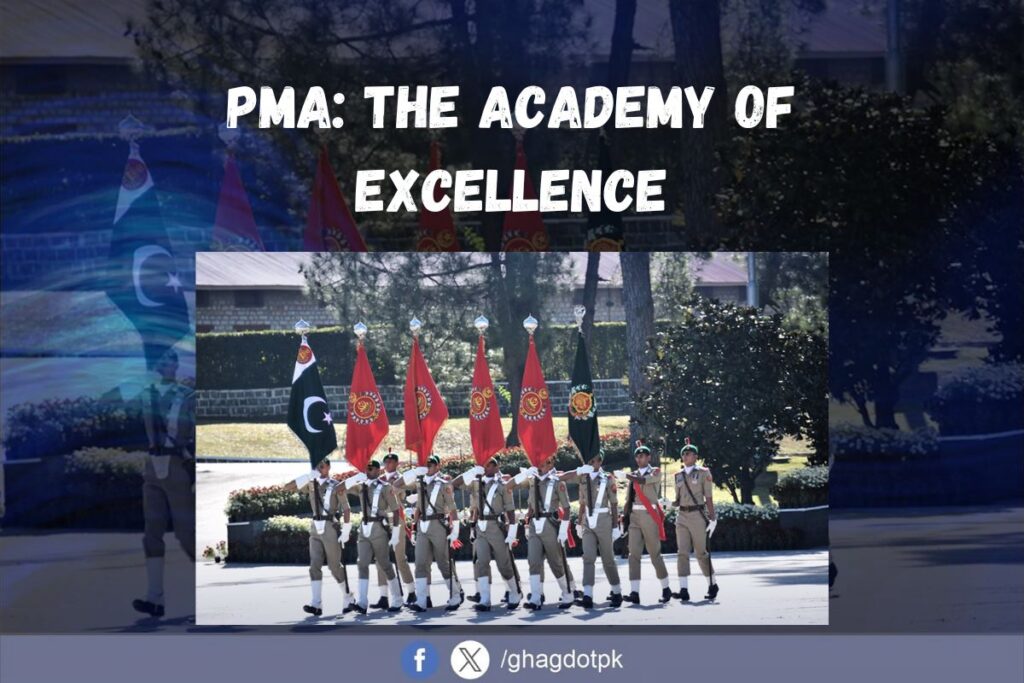PMA: The Academy of Excellence
By Aishma Gul
“Leadership is earned through discipline and service.” This guiding principle defines the Pakistan Military Academy (PMA) Kakul’s mission to develop exceptional leaders. Recently, on October 19, 2024, the PMA marked a significant milestone with the passing out parade of the 150th PMA Long Course, 69th Integrated Course, 24th Lady Cadet Course, and 36th Technical Graduate Course. This year’s cohort also includes cadets from Iraq, Jordan, the Maldives, and a number of other countries, demonstrating PMA’s role in promoting worldwide military cooperation.
Celebrating Future Commanders
The passing out parade concludes years of intensive training. Chairman Joint Chiefs of Staff Committee (CJCsSC) General Sahir Shamshad Mirza presided over the ceremony, awarding honors to the top-performing cadets. Battalion Senior Under Officer Abdullah Afzal received the renowned Sword of Honour, for his outstanding leadership abilities. Similarly, Battalion Senior Under Officer Babar Ullah Aman received the President’s Gold Medal, while Friendly Country Senior Under Officer Kshitij Gurung of Nepal received the Overseas Gold Medal, highlighting Pakistan’s close ties with its allies.
A Legacy of Excellence
The Pakistan Military Academy (PMA), located in Kakul, Abbottabad, was founded in 1947, shortly after Pakistan was created. It is the major military institution responsible for training future Pakistan Army officers. PMA, which is modelled after the Royal Military Academy Sandhurst, is well-known for its rigorous training, discipline, and leadership development programs.
Over the years, the academy has garnered a reputation for producing highly skilled military personnel, not only for Pakistan but also for numerous other countries. PMA has trained cadets from countries such as Jordan, Iraq, Maldives, Sri Lanka, and Sudan, making it a key institution in promoting military cooperation between Pakistan and other nations.
PMA graduates have made significant contributions to national defence, UN peacekeeping deployments, and disaster relief activities. Furthermore, the academy’s alumni include high-ranking officers who have led successful campaigns, received international military honours, and held important roles in peacekeeping and defence diplomacy.
Women in the Military
This year’s parade was also a big step towards gender equality in the military. Pakeeza Yaqoob, Course Under Officer of the 24th Lady Cadet Course, was awarded the Commandant’s Cane in appreciation of her outstanding performance. According to the Ministry of Defence, the role of women in the Pakistan Army has gradually increased since the accession of female officers in 2002, with over 4,000 women now serving in diverse capacities, including combat support positions.
Pakistan’s military’s inclusion of women is a reflection of both progressive policy inside the armed services and broader societal trends. These developments parallel other advancements, such as Pakistan’s induction of female fighter pilots in 2006. Women in the Pakistan Army are increasingly taking on leadership roles, breaking through barriers in traditionally male-dominated fields.
PMA’s Global Influence
With cadets graduating from nations like Iraq, Jordan, and Nepal, PMA’s influence goes beyond Pakistan’s boundaries. Over the years, PMA has trained cadets from more than 30 countries, creating a network of military leaders across the globe. This collaboration helps strengthen diplomatic and defense ties, promoting peace and security across regions.
Pakistan has received recognition in recent years for its contributions to international military cooperation. According to United Nations Peacekeeping estimates, Pakistan is one of the greatest providers of peacekeeping forces, with approximately 4,000 to 5,000 troops serving in UN operations across the world. This contribution reflects Pakistan’s long-standing commitment to international peacekeeping, much of which is made possible by the training its officers undergo at institutions such as PMA.
Training Tomorrow’s Defenders
PMA has built a legacy of producing top-tier military officers since its founding. The academy’s curriculum emphasizes leadership, modern combat strategies, and the use of advanced military technologies. With a staff-to-cadet ratio of approximately 1:4, the academy ensures each cadet receives personalized training in a range of disciplines, including leadership, tactics, and strategy. PMA continues to innovate, incorporating simulation-based training to keep pace with evolving warfare tactics, as highlighted in an ISPR report.
Pakistan’s Peacebuilding Efforts
The passing out parade at PMA Kakul demonstrates the professionalism and dedication of Pakistan’s armed forces. PMA affects Pakistan’s defence future while also playing an important role in global security by developing international military collaboration and breaking down gender barriers. With a focus on diversity, advanced training, and international outreach, PMA is well-positioned to build on its tradition of military education excellence.
Pakistan’s commitment to promoting peace and cooperation through improved PMA training efforts and strategic defense alliances demonstrates its unshakeable commitment to regional and worldwide security.






